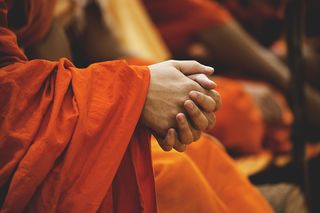Addiction
Spiritual Approaches to the Opioid Crisis
A Thai Buddhist monastery offers a successful model for healing addiction.
Posted April 7, 2018

Headlines in Canada and the U.S. are now telling us that the opioid crisis is being compared to the AIDS epidemic at its peak, and its ravages are being likened to those of the Vietnam War.[i] The primary response has been medical and ubiquitous notices advertising the availability of Naloxone at many North American drug stores are a sad sign of the times. As a culture, however, we seem to be at an impasse regarding what can be done about the actual problem of substance use and addiction. The fact that those who overdose are from every strata of society, from the very rich to the very poor, points to a widespread cultural malaise.
Of course, the first response to this situation has to be based in compassion towards the person who has suffered an overdose and their families. The next step needs to work towards envisioning a larger solution, and it is at that stage we seem to be stymied. In his 2008 book “ The Globalization of Addiction. A Study in Poverty of the Spirit” social psychologist Bruce K. Alexander predicted that addiction of every sort, from drugs to gambling and consumerism, would become increasingly common. He writes that our society creates material wealth but also,“ a kind of dislocation or poverty of the spirit that draws people into addiction and other psychological problems.”[ii]
There has been a great deal of controversy about what causes addiction but in this post we would like to look at some of the solutions offered by the world’s spiritual traditions. The Thai Buddhist monastery Wat Thamkrabok offers an intriguing model and has shown remarkable success with treating many different forms of addiction. The work of the monastery emerged in the wake of a growing problem with opium addiction in 1950’s Thailand. Word of high recovery rates from addiction as a result of the programme at Thamkrabok has increasingly spread to the west to the point where the National Health Services of both the UK and Ireland have paid for people to take treatment in Thailand. So what is the key to their success? From the point of view of people within spiritual traditions such as Theravada Buddhism the answer is always a holistic and religious one.
Those who enter into the monastery have to take a vow not to take any drugs and are taught forms of meditative practice, undergo physical purification, including herbal remedies, medicinal saunas, and have to abide by the routines of the monastery including performing work around the temple. While the foreign press tends to focus on the public vomiting that is only one aspect of a much larger tapestry of health routine and contemplative practice. The Abbot, interviewed in a CCTV documentary, states that rehabilitation is 80% about the mind and 20% about the physical practices.[iii]
One of the keys to recovery taught by the monks is to encourage and reinforce healthy ways of living and thinking and from a Buddhist perspective to purify the body and mind. Contemplative psychologies commonly separate mental habits into healthy and unhealthy category with the aim of strengthening the healthy while decreasing the unhealthy ones.[iv]. Spiritual approaches can aid in re-balancing mental and emotional states even in a secular setting as has been demonstrated by the work of pioneers such Jon Kabat Zinn. However, with syndromes as serious and deeply rooted as addiction it seems that complete immersion in a traditional setting provides a therapeutic holding environment that is vital to its success. Those who participate are essentially living as monks or nuns for the period of their treatment.
The Thamkrabok monastery offers a time tested form of discipline; a word that has become controversial in our secular culture. Discipline is often understood as authoritarian rigidity whereas spiritual traditions understand it as a necessary form of structure. As chaotic emotional and social lives are typical of addicts creating structure and order is a vital part of treatment.
Wat Thamkrabok also teaches a system of self-cultivation that fosters the full development of the human being. This makes the process something different from simply being a detox. Buddhist practices aid in creating a sense stability and purpose within the self that will allow the person to avoid back sliding. Importantly, the setting also provides a space for self-reflection that allows the individual to begin to imagine what a meaningful and well- lived addiction free life would look like.
The key here is the holistic approach where all aspects of the self are taken in account, the physical, the mental, the social and the spiritual. In this process the individual takes active part in their healing while contributing and being accountable to a larger community and within a larger framework of meaning.
As we face the unnerving escalation of the opioid crisis in North America it is important that we take a “searching moral inventory” as the Methodists used to say. Dealing with the physical aspects of the problem is only one part of the larger challenge that is facing us. Wat Thamkrabok offers a possible model for how we can face the larger malaise that is contributing to this crisis.
[i] Allison Tierney, “Canada’s Health Minister Says Opioid Crisis Deaths Have Surpassed AIDS epidemic.” VICE, May 15, 2017, Ashley Welch, “Drug Overdoes Killed More Americans Than the Vietnam War.” CBS News, October 17, 2017.
[ii] Bruce K. Alexander. “The Globalization of Addiction. A Study in the Poverty of the Spirit.” Oxford: Oxford University Press, 2008. p.12.
[iii] “Thailand’s Rehab Temple” CCTV news, https://www.youtube.com/watch?v=Ozv4oRZHtkY
[iv] Danny Wedding and Raymond Corsini, “Current Psychotherapies.” Belmont: Brooks/Cole, 2011.p.462.




